 Image search results - "Shimane" Image search results - "Shimane" |

JR Izumo-shi Station in the 1990s.
|
|

Taisha Station, closed in 1990 and preserved as an Important Cultural Property. 大社駅
|
|

Izumo Hinosaki Lighthouse 出雲日御碕燈台Went there by bicycle.
|
|

Tachikue Gorge 立久恵峡
|
|

Adachi Museum of Art provides a free shuttle bus ride from JR Yasugi Station. The bus schedule is here, but this is not the bus. Also online: https://www.adachi-museum.or.jp/en/shuttle_bus.
|
|

This is the shuttle bus to Adachi Museum of Art. It is slightly behind the bus schedule sign.
|
|

Adachi Museum of Art is celebrated for its beautiful Japanese garden and superb artworks especially by Yokoyama Taikan. And in such a rural place. Amazing.
|
|

The museum was founded in 1970 by Adachi Zenko (1899–1990), a native of Yasugi. He was a successful local merchant as a textile wholesaler and real estate business.He collected Yokoyama Taikan paintings and he thought they went well with the museum's beautiful landscape garden. Free shuttle bus ride from JR Yasugi Station.
|
|

Since it was New Year's 2018, kadomatsu at the museum entrance.
|
|

Mr. Adachi pointing the way to the garden.
|
|
|

The museum has super clean picture windows for viewing the gardens.
|
|

Adachi Museum of Art garden, Shimane Prefecture.
|
|

Adachi Museum of Art garden.
|
|

Adachi Museum of Art garden, Shimane Prefecture.
|
|

Adachi Museum of Art garden, Shimane Prefecture.
|
|

Adachi Museum of Art garden, Shimane Prefecture.
|
|

Adachi Museum of Art garden waterfall, Shimane Prefecture.
|
|
|

Koi pond
|
|

Picture window with no glass.
|
|

Natural scroll next to a Buddhist altar.
|
|

Adachi Museum of Art garden, Shimane Prefecture.
|
|

Adachi Museum of Art garden, Shimane Prefecture.
|
|

Adachi Museum of Art garden, Shimane Prefecture.
|
|

Sculpture at Adachi Museum of Art garden, Shimane Prefecture.
|
|

Yasugi is a rural city most famous for the Yasugi-bushi folk song and dance. It has JR Yasugi Station.
|
|

JR Yasugi Station welcomes visitors to the land of Yasugi-bushi.
|
|

JR Yasugi Station welcomes visitors to the land of Yasugi-bushi.
|
|

JR Yasugi Station welcomes visitors to the land of Yasugi-bushi.
|
|

Yasugi-bushi Engeikan Hall is a Japanese-style theater where they perform Yasugi-bushi, a local folk song and dance.
|
|

The hall includes a gift shop and restaurant. Yasugi-bushi Engeikan is next to Adachi Museum of Art. Easy to see both places.
|
|

Giant loach in front of the hall in Yasugi, Shimane.
|
|
|

Inside the Yasugi-bushi Engeikan Hall is a Japanese-style theater. They perform four times per day. Admission is ¥600 for adults, ¥300 for kids.
|
|

Hanamichi in the theater.
|
|

Comfortable chairs.
|
|
|
|
|
|
|
|
|
|

Playing the tsuzumi shoulder drum.
|
|

The most famous Yasugi-bushi song is "Dojo-sukui" (Loach Scooping) danced by a Hyottoko comical man. The dancer uses a basket scoop to catch the loaches.
|
|
|
|
|
|
|

"Dojo-sukui" (Loach Scooping) also danced by women.
|
|
|
|
|
|
|
|
|
|

Afterward, they invited members of the audience on stage to try the loach scooping dance.
|
|

Names of the performers from the Yasugi-bushi Preservation Society.
|
|

Display hall for Yasugi-bushi.
|
|

About Yasugi-bushi.
|
|

Tsuzumi shoulder drums used in Yasugi-bushi.
|
|

Gift shop sells dojo loach confections.
|
|

Next to the theater is this restaurant.
|
|

Nice lunch.
|
|

Took the free shuttle bus from Adachi Museum of Art to go back to JR Yasugi Station on the San'in Line.
|
|
|

Inside JR Yasugi Station.
|
|
|
|

JR Yasugi Station on the San'in Line.
|
|

Iwami Kagura train at JR Yasugi Station.
|
|
|

My train home at JR Yasugi Station. San'in Line.
|
|
|

Entrance to Gesshoji Temple with numerous tombs for the Matsudaira clan who ruled the Matsue domain.
|
|

Sumo wrestler monument for Raiden Tameemon (雷電為右衛門).
|
|

Raiden's handprints.
|
|
|

Go to the reception desk.
|
|

Entrance to tea room
|
|

Tea room.
|
|
|

Approaching the tomb of Matsudaira Harusato (Fumai), seventh lord of the Matsudaira clan.
|
|

Tomb of Matsudaira Harusato (Fumai), seventh lord of the Matsudaira clan.
|
|
|
|
|
|
|
|
|
|
|
|
|
|
|
|
|
|
|
|
|
|
|
|
|
|
|
|
|
|
|
|
|
|
|

Stone lanterns
|
|
|
|
|
|
|
|

The famous giant tortoise at Gesshoji Temple, Matsue. They put a stone pillar on its back so it wouldn't walk around at night and wreak havoc. Animal cruelty?
|
|
|
|

The famous giant tortoise at Gesshoji Temple, Matsue.
|
|
|
|
|
|

Izumo Taisha Shrine is one of Japan's Top Three most famous and important Shinto shrines. Historically, it may be Japan's oldest shrine. The Honden hall is a National Treasure.Izumo Taisha Shrine's first torii called Otorii (Giant Torii). I visited Izumo Taisha on New Year's Day Jan. 1, 2018. 大鳥居
|
|

Sign reads, "Izumo Taisha" (出雲大社). The shrine's officially named "Izumo Oyashiro" written with the same kanji.Izumo Taisha worships Okuninushi (大国主大神), the Shinto god of marriage and Kotoamatsukami, the very first Shinto gods born in heaven even before Japan was created.
|
|

Torii pillar
|
|
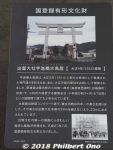
About the Otorii.
|
|

Giant torii as it looked years ago, minus the new paint job.
|
|

Closest train station to Izumo Taisha Shrine is Izumo Taisha-mae Station on the Ichibata Taisha Line. There are also buses running from Izumo-shi Station. 出雲大社前駅
|
|

Inside Izumo Taisha-mae Station on the Ichibata Taisha Line. Opened in 1930, now a Tangible Cultural Property of Japan.
|
|

Inside Izumo Taisha-mae Station.
|
|

Izumo Taisha-mae Station trains. If you're staying near Izumo-shi Station, taking a bus is more convenient.
|
|

Retro style building on the way to the shrine.
|
|

On New Year's Day 2018, cars and people crowd the road to the shrine.
|
|

Izumo, Shimane manhole. Shows Hinomisaki lighthouse.
|
|

On New Year's Day 2018, many people visit Izumo Taisha Shrine by car. Lots of parking was provided, but I always saw the "Full" sign.
|
|

This is the second and most popular torii at Izumo Taisha. With the big stone pillar engraved with "IZUMO TAISHA."
|
|

Lots of people took selfies here in front of the torii and "IZUMO TAISHA." For Instagram of course.
|
|

Lots of people took selfies here in front of the torii and big stone pillar engraved with "IZUMO TAISHA." For Instagram of course.
|
|

Lots of people took selfies here in front of the torii and big stone pillar engraved with "IZUMO TAISHA." For Instagram of course.
|
|

Sando path to the shrine. 参道
|
|

Sando path to the shrine. 参道
|
|

Sign says we are not to walk along center path in order to protect the roots of the pine trees. I'm also told that this center path is reserved for the gods visiting the shrine..
|
|

This center path is reserved for the gods visiting Izumo Taisha. Humans have to walk on the side paths to the shrine. 参道
|
|

Second torii to Izumo Taisha.
|
|

Second torii looking toward the exit.
|
|

The Sando path to the shrine is actually in the center toward the left of the photo. But they have blocked off the center path to protect the roots of the pine trees. Now thay have made concrete sidewalks outside the center path.
|
|

Approaching the third torii.
|
|

Water basin 手水舎 I got there at around 8:30 am and it wasn't so crowded. Of course, there were people, but there was no problem walking to the shrine. No stopping like at other famous shrines like Ise Jingu and Meiji Shrine on New Year's Day. Izumo Taisha was sparse in comparison.
|
|

Water basin 手水舎
|
|

Third torii made of copper and the Haiden. 碧銅の鳥居と拝殿
|
|

Izumo Taisha's Haiden worship hall where you can hold prayers and other ceremonies like in a church. Rebuilt in 1959 after the previous one was lost in a fire in 1953. 拝殿
|
|
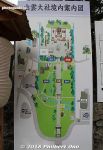
Map of Izumo Taisha Shrine. Not as huge as Ise Jingu, but large enough.
|
|
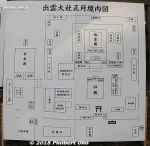
Map of Izumo Taisha's central buildings centering on the Honden.
|
|

Izumo Taisha's Haiden worship hall.
|
|

Izumo Taisha's Haiden worship hall's shimenawa sacred rope.
|
|

Haiden and shimenawa sacred rope 拝殿. The Haiden was built in 1959 after the original building was destroyed by fire in 1953.
|
|

Shimenawa sacred rope
|
|
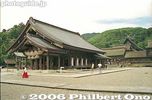
Haiden and Honden behind it.
|
|

Back of Haiden.
|
|

Gate to the Honden, the god's residence.
|
|
|

Barrels of sake decorating the perimeter near the gate to the Honden.
|
|

Gate to the Izumo Taisha Honden, the god's residence.
|
|

Emblem on the gate.
|
|

Gate to the Izumo Taisha Honden. Photography was not permitted beyond this gate. It was just a small deck with an offertory box in front of the Honden's Romon Gate. They also sold small dishes of sake.
|
|

Carvings on the Gate to the Izumo Taisha Honden.
|
|

Omikuji charms.
|
|
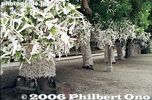
Omikuji charms.
|
|

You can walk completely around the main shrine buildings outside the fence at Izumo Taisha.
|
|

The large roof of the Honden Hall (god's residence) can be seen in the center.
|
|

The Honden is flanked on both sides by smaller shrines.
|
|

Honden (largest and tallest structure) flanked on both sides by smaller shrines.
|
|

Photo of the Izumo Taisha Honden. Built in the Taisha-zukuri style. National Treasure. 本殿
|
|

Smaller shrine. 氏社
|
|

Fence surrounding the Honden.
|
|

Izumo Taisha's Honden built in the Taisha-zukuri style as seen from the left corner. National Treasure. 本殿
|
|

Izumo Taisha's Honden built in the Taisha-zukuri style. National Treasure. 本殿
|
|

Shokokan, a museum of dolls. Tangible Cultural Property of Japan. 彰古館
|
|

Back of Izumo Taisha's Honden in the Taisha-zukuri style. National Treasure. 本殿
|
|

Back of Izumo Taisha's Honden in the Taisha-zukuri style. National Treasure. Rabbits or hares look on too. 本殿
|
|

Rabbits or hares at Izumo Taisha, symbol of fertility and marriage.
|
|

Soga Shrine, a smaller shrine behind the Honden. 素鵞(そが)社本殿
|
|

Soga Shrine, a smaller shrine behind the Honden. 素鵞(そが)社本殿
|
|

Shrine library built in 1667 and moved here in 1914. 文庫
|
|

About the shrine library. Mito Komon once donated books to this library.
|
|

Rear side view of the Amasaki-no-Yashiro, Mimukai-no-Yashiro, and Honden shrines. 東端垣から天前社・御向社・本殿を望む
|
|

Izumo Taisha's Honden, a National Treasure. The V-shaped roof ornaments (chigi), an unmistakable trademark of Shinto, also look slightly different from other shrine architectural styles.
|
|
|
|
|
|

Shrine priests praying in front of the Honden on New Year's Day 2018.
|
|

Signs in English including a QR code.
|
|
|
|
|

Taisha-zukuri architecture.
|
|
|

East Jukusha Shrines where the millions of visiting gods lodge during the Kami-ari-zuki festival in autumn. There's also a twin building on the west side. 十九社 八百萬神
|
|

Izumo Taisha has many smaller shrines surrounding it.
|
|
|
|
|
|

Izumo Taisha ema prayer tablets.
|
|

Izumo Taisha ema prayer tablet for the Year of the Dog.
|
|

Izumo Taisha ema prayer tablet for a good marriage.
|
|

Lots of construction going on in jan. 2018.
|
|
|

New shrine office under construction.
|
|

Near the gate to the Honden are souvenir tents during New Year's.
|
|
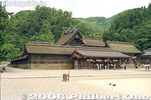
Without the tents.
|
|

West Jukusha Shrines where visiting gods lodge during the Kami-ari-zuki festival. There's also a twin building on the east side. 十九社 八百萬神
|
|

Way to the Kaguraden Sacred Dance Hall.
|
|

Kaguraden Sacred Dance Hall
|
|

Kaguraden Hall (for sacred dances) is famous for its gigantic straw rope. It looked pretty faded and I was told that it will be replaced in 2018. They replace it once every 7 years or so.
|
|
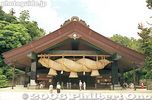
Izumo Taisha's Kaguraden with the iconic giant shimenawa sacred rope weighing 5 tons. Built in 1981. 神楽殿と注連縄
|
|

Giant shimenawa straw rope of Izumo Taisha Shrine's Kaguraden, the largest sacred rope in Japan. Weighs 5 tons.
|
|

Closeup of the giant shimenawa straw rope.
|
|

Rear side of the giant shimenawa straw rope.
|
|
|

Under the giant shimenawa straw rope.
|
|

Entrance to Izumo Taisha's Kaguraden.
|
|

Izumo Taisha's Kaguraden.
|
|

Izumo Taisha's Kaguraden.
|
|

Small pond next to the Kaguraden.
|
|

Small dishes for a sip of sake if you give a small donation. They also had this in front of the Honden.
|
|

Kaguraden entrance area
|
|

New Year's
|
|
|
|
|

Local manga figure based on the Izumo no Okuni dancer. She was from Izumo and originated kabuki in the early 17th century. 出雲阿国
|
|

Souvenir shop selling all kinds of Izumo Taisha goods.
|
|

Souvenir shop selling all kinds of Izumo Taisha goods.
|
|

Souvenir shop selling all kinds of Izumo Taisha goods.
|
|

Shimane's official tourism mascot named "Shimanekko," a yellow cat with a shrine roof cap. しまねっこ
|
|

Lawn outside Shimane Museum of Ancient Izumo.
|
|
|
|

New Year's kadomatsu at Shimane Museum of Ancient Izumo.
|
|
|

Shimane Museum of Ancient Izumo is celebrating its 10th anniversary in 2018.
|
|

Remains of the giant pillars of the ancient Izumo Taisha.
|
|

The museum's centerpiece exhibit is this scale model of Izumo Taisha's Honden Hall from the 10th-century Heian Period.
|
|

People believe that the original shrine was on high pillars accessible by this long, sloping wooden steps. Really awesome.
|
|
|
|
|

The elevated shrine supposed to make it closer to gods.
|
|

Little priests going up the many stairs.
|
|

Wonder how resistant this was to typhoons and earthquakes.
|
|
|
|
|

High wooden pillars supporting the Honden Hall so that it is closer to the gods.
|
|

Very impressive model of the shrine.
|
|
| 765 files on 4 page(s) |
1 |
 |
|